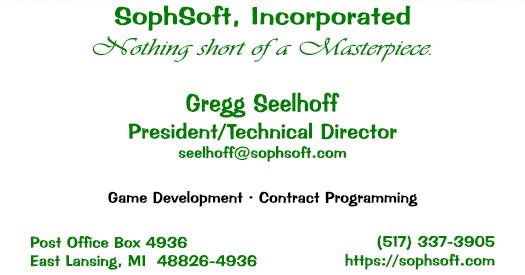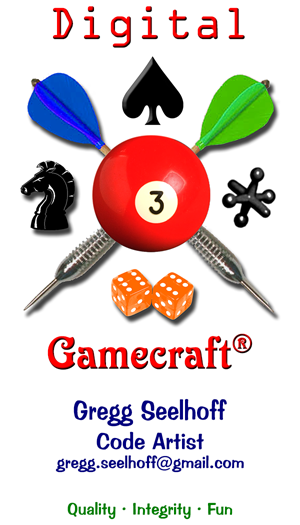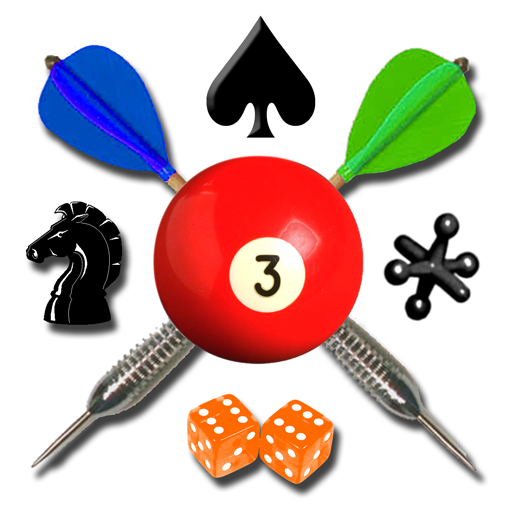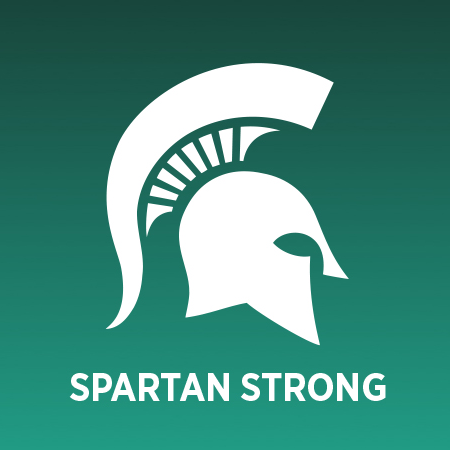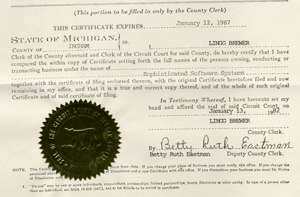Straight scoop: I need to find more (paying) work, and soon. I am raring to go on new development, bringing my extensive experience and expertise to bear on another interesting project (or several). If you need software development done, I can help you, whether that is via consulting and/or contract development through my company or as an employee at yours. I am also very open to funding opportunities for the next game product we are creating internally.
SophSoft, Incorporated has developed and/or consulted on dozens of commercial games over the years, including the complete production of more than 20 SKUs, and our clients have included companies such as Microsoft, Zombie, Legend Entertainment, MVP Software, Goodsol Development, and Scooter Software, as well as numerous other small companies. We have the skills and contacts to create any small to mid-size game from scratch, to assist the development of any size project, and to provide technical research and industry knowledge to help resolve issues and remove roadblocks.
I am Gregg Seelhoff, a lifelong game developer, a uniquely experienced programmer, and the founder and principal of SophSoft and Digital Gamecraft®, its game publishing division. Games and computer programming are two of my passions. In pursuit of those passions, I have worked on scores of published titles, as well as countless unpublished projects. Here are a few notable facts to illustrate the breadth and depth of my expertise:
- I have worked on blockbuster titles, smaller retail products, shareware and self-published games, as well as multimedia software, tools, and hardware drivers.
- I have led small development teams, programming groups within larger companies, and solo projects from conception to release.
- I have worked on cutting-edge AR products within a hardware manufacturer and written VR drivers for first generation hardware.
- I have personally developed custom AI engines for playing traditional games at world-class strength.
- I led programming on a major Star Trek title, a cancelled Dungeons and Dragons project, and drivers for a Star Wars product.
- I founded, and still run, the oldest indie game development company in the world.
- I have worked on adventure games, RPGs, board and card games, FPSes, and arcade games, as well as in other genres.
- I won an international programming competition while still in high school and have continued to steadily improve my abilities since that time.
- I contributed to a Game of the Year winner, and had a solo project featured in books and magazines.
- I have developed more solitaire games than anybody else on the planet.
- I was twice elected as Chairman of the Board for an international industry marketing organization.
- I won a Shareware Industry Award for a game that I developed as the sole programmer and primary designer.
In addition to my programming expertise, ability to quickly learn and adapt, and general resilience, my industry experience provides the skills to build cohesive teams, mentor developers, and improve standards and processes, as well as to provide useful feedback beyond my core competencies. Imagine how I can improve your team.
For (perhaps too many) details, you can get my full unabridged resume/CV here:
https://sophsoft.com/samples/GKSresume.pdf
Whether you have a game project you want my company to develop (or port), want to give some additional direction to an existing team, or simply need to get some programming done, please contact me to see how we can reach your goals together.

